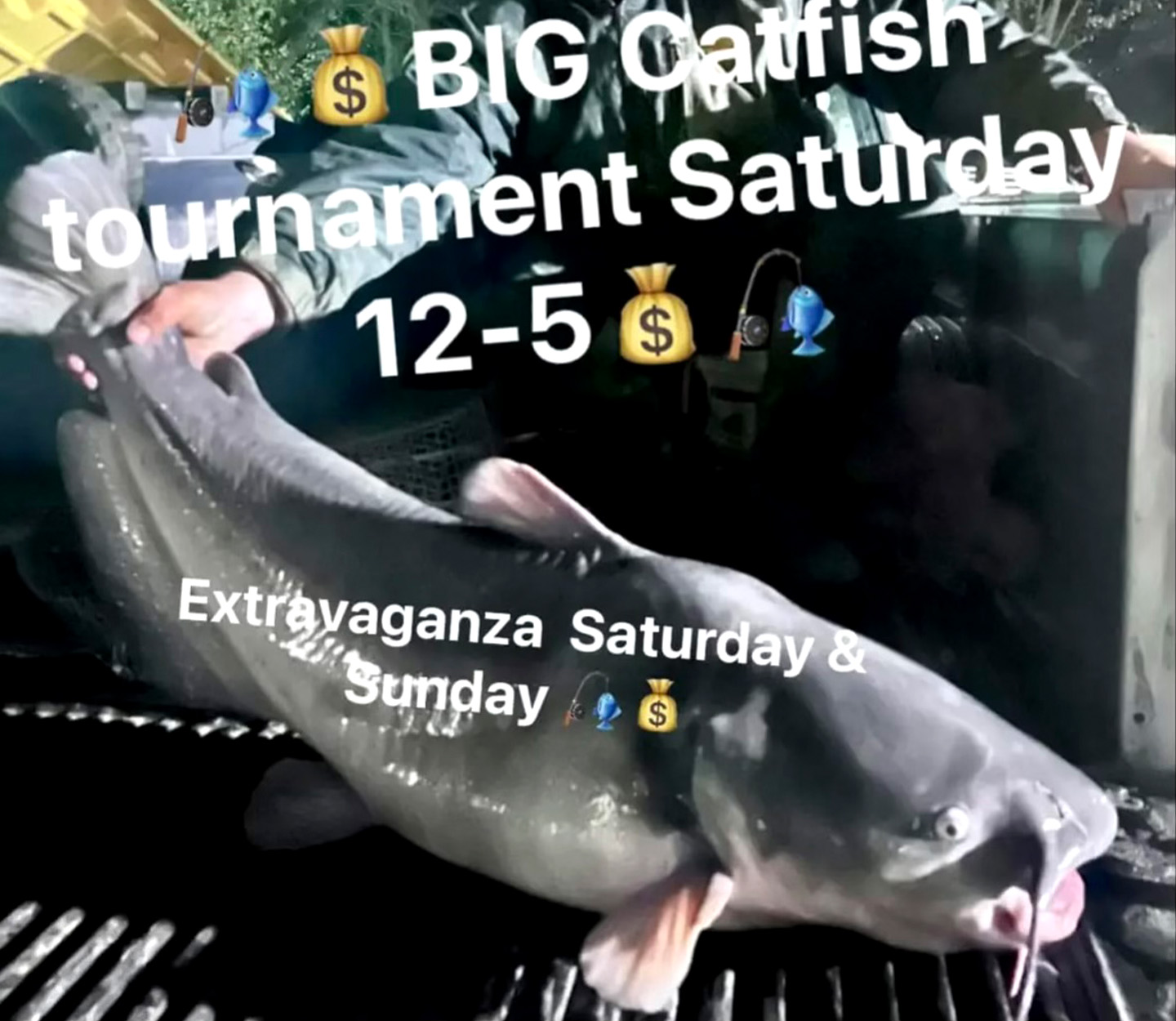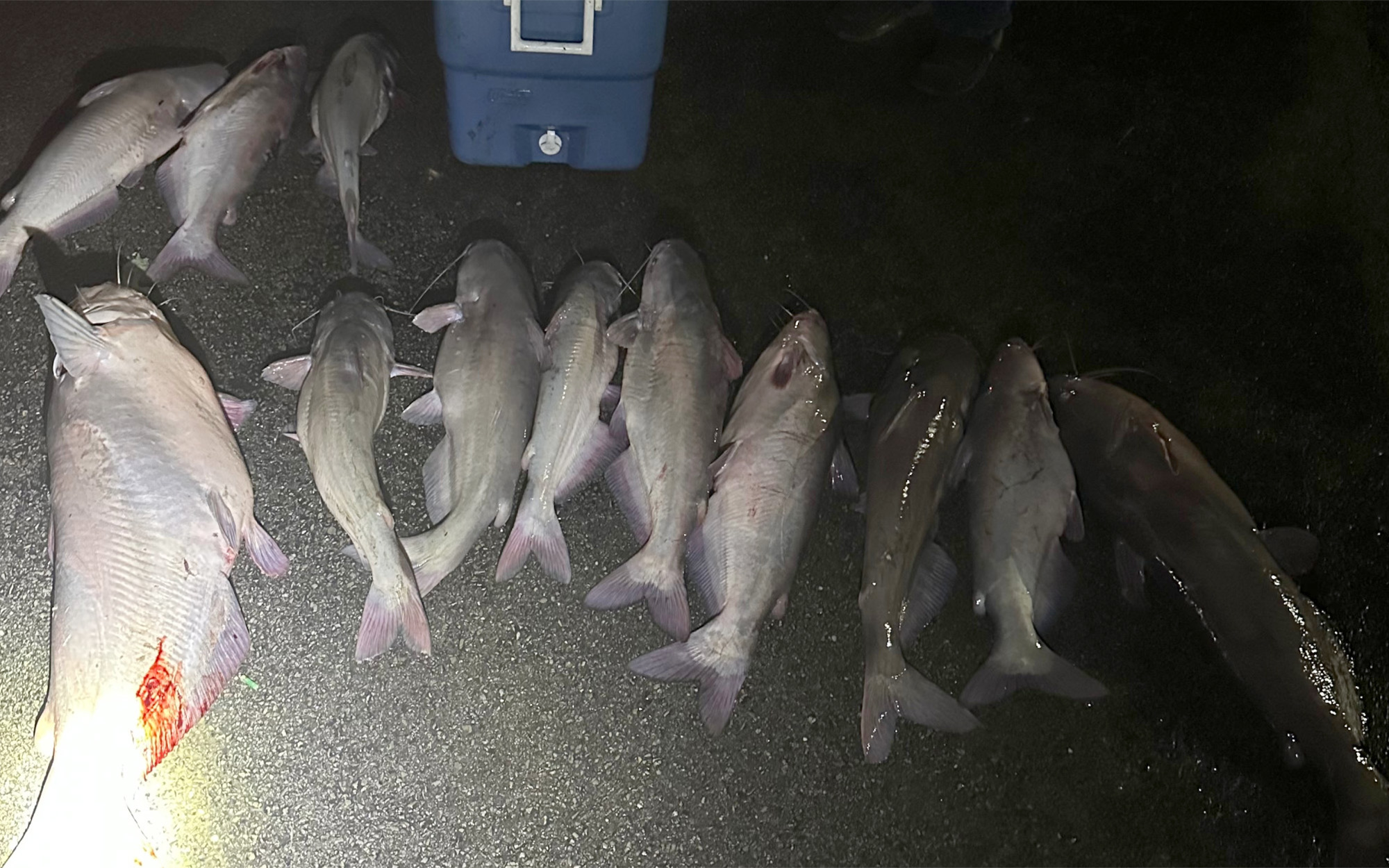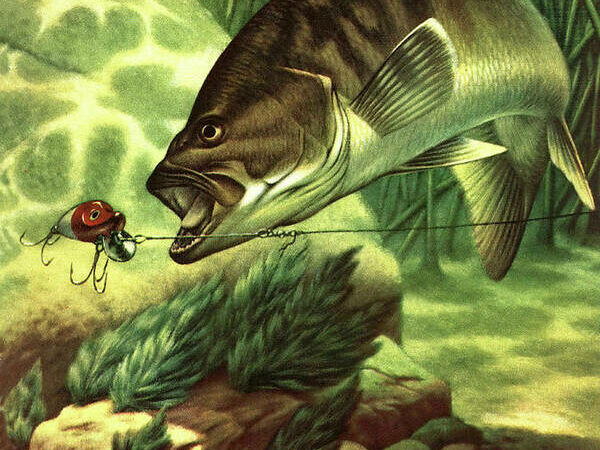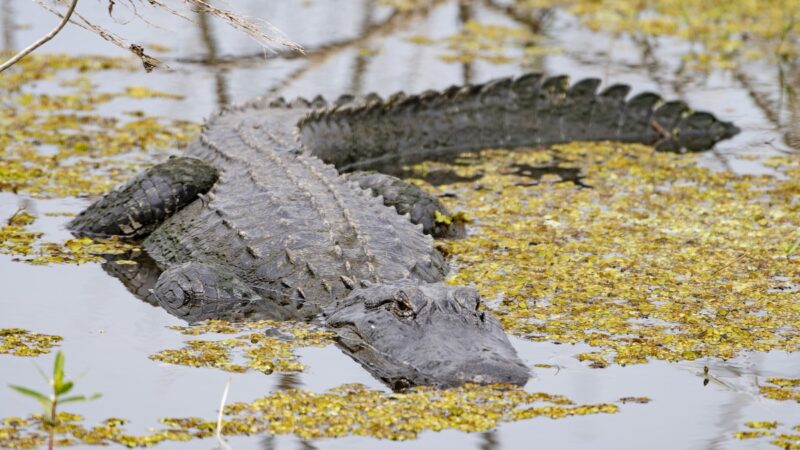Catfish Trafficking Ring Busted in the South Allegedly Smuggled Trophy Cats into Pay Lakes and Across State Lines
Law enforcement officials have cited a series of pay lake operators, catfish anglers, and other suspects in a multi-state trafficking bust. The suspects were allegedly involved in harvesting catfish illegally and selling them to various pay lakes — sometimes transporting them across state lines to do so.
A total of nine perpetrators were cited for 180 wildlife violations across Kentucky, Alabama, and Tennessee, Kentucky Department of Fish and Wildlife game warden Cody Fox tells Outdoor Life. Throughout 2023, anglers from Kentucky and Alabama caught thousands of pounds of trophy catfish (both flatheads and blues) without the requisite permits, and then transported and sold those catfish to various pay lakes (which are privately owned lakes that anglers must pay to access) throughout the three states.
Non-commercial anglers in Kentucky can only harvest one trophy-sized catfish per day, and commercial anglers must have the proper permits to harvest more than one. Catfish 35 inches or larger are considered “trophy-sized.”
One lake in particular, Green Valley Pay Lake in Glasgow, Kentucky, was the focal point of KDFW’s investigation.
“People were going to Barren River Lake and catching over their limit of catfish and, in turn, taking these catfish and selling them to Green Valley Pay Lake,” Fox says, explaining that non-permitted anglers charge less for trophy catfish than permitted, commercial anglers would charge in a legal transaction. “The pay lake is turning a profit. These people selling catfish to Green Valley were not legal commercial fishermen, and Barren River Lake is closed to any sort of commercial fishing.”
The illegal sales dated back to 2023, and KDFW’s investigation began in 2024. Fox says he was originally tipped off by posts he saw in his social media feeds, which showed evidence of people harvesting over their legal limit of catfish at some nearby pay lakes. He points out that many of those operations have since deleted a lot of content from their Facebook pages.

Photo courtesy Kentucky Department of Fish and Wildlife
Search warrants and compliance checks revealed that the pay lake operators knowingly purchased catfish caught from restricted waterways like Barren River Lake. They did not keep any record of their purchases, and they did not have any information on file regarding the origins of the catfish in question.
“The pay lake owner is required by law to keep certain documents regarding where fish are coming from that enter their lake,” he says. “This is to address safety concerns. People are catching and eating [these fish]. Well, they could be coming from waters with high mercury content, or other issues. The operators are required by law to document where they’re buying the fish from, which they didn’t do.”
Throughout a series of compliance checks and search warrants, Fox and other investigators also caught wind of two Alabama catfish anglers who were catching over-limits and selling the fish to Green Valley, as well as other pay lakes in Tennessee. At this point, KDFW notified both the Alabama Game and Fish Division and the Tennessee Wildlife Resources Agency.
Read Next: Poachers Caught with 71 Fish Stuffed in Their Backpacks, Including Trophy Bass
The two Alabama suspects ultimately caught and sold some 6,400 pounds of catfish to Green Valley before getting caught. Any live transport of catfish outside Alabama state lines is illegal, Fox points out, and as soon as those anglers crossed the state border, they also violated the Lacey Act, which elevates any sort of interstate wildlife violation to a federal crime. This meant that the U.S. Fish and Wildlife Service got involved as well.
Many details behind the allegations remain under wraps as the case is still under investigation and in the early stages of the charging process. But local news outlet WBKO filed a public information request with KDFW that revealed the identities and charge sheets for five of the nine suspects:
- Melinda Carter, age unspecified, Glasgow, Kentucky, pay lake operator: 81 counts of buying, selling, and transporting protected wildlife, 2 counts of violating pay lake operations regulations. Court proceeding pending.
- Danny Whitmire, 50, Town Creek, Alabama, commercial fisherman: 7 counts of buying, selling, and transporting protected wildlife, 2 counts of violating regulations due to lack of transportation permit and live fish/bait dealer’s license. Court proceeding pending.
- April White, 46, Bridgeport, Alabama, commercial fisherman: 7 counts of buying, selling, and transporting protected wildlife, 2 counts of violationing regulations for lack of transportation permit and live fish/bait dealer’s license. Court proceeding pending.
- Samuel Hatcher, 45, Glasgow, Kentucky, cooperating witness: pled guilty to 9 counts of size and creel violations, resulting in a $450 fine.
- Brandon Patrick, 30, Glasgow, Kentucky: 68 counts of buying, selling, and transporting protected wildlife, 4 counts of violating commercial fishing regulations, additional unknown license violations. Court proceedings pending.
Pay lakes are popular among anglers in the Southeast, especially those with families or beginners, as they typically have healthy populations of large fish that are easy to catch. But Fox says these kinds of lakes have also become an issue for the agency because the small operations can easily fly under the radar.

Photo courtesy Kentucky Department of Fish and Wildlife
“Pay lakes in Kentucky have very few rules to follow,” he says. “For them to be that negligent…it’s basically a black market. These catfish are all thirty to seventy pounds for the most part, and it can take twelve to thirty years for a catfish to reach that size. We have seventy or eighty pay lakes in Kentucky, and a lot of them are doing the exact same thing. This pay lake in particular brought in over 9,000 pounds of catfish in one year alone. Of course, not every pay lake is doing this, but a lot of them are.”
Read Next: 101-Pound Blue Catfish Caught on Jugline Is Officially the New Ohio Record
Fox acknowledges that lawful pay lakes are valuable to anglers who, for whatever reason, might not be able to chase trophy fish in a more natural setting. But KDFW has received ample feedback (mostly in the form of Facebook comments) from the public about pay-lake schemes and their detrimental effect on catfish populations in public waterways. Fox hopes this investigation can prove to the public that they’re listening.
“We’re getting more restrictive with commercial catfishing and these pay lakes, because it’s an issue of conservation,” he says. “It doesn’t matter what we post on Facebook. It could be a deer case or a turkey case, and the comments all complain about commercial catfishing. We’re trying to put a stop to it the best we can and show the general public that we’re trying to conserve these fish.”
The post Catfish Trafficking Ring Busted in the South Allegedly Smuggled Trophy Cats into Pay Lakes and Across State Lines appeared first on Outdoor Life.
Source: https://www.outdoorlife.com/conservation/catfish-trafficking-ring-pay-lakes/




